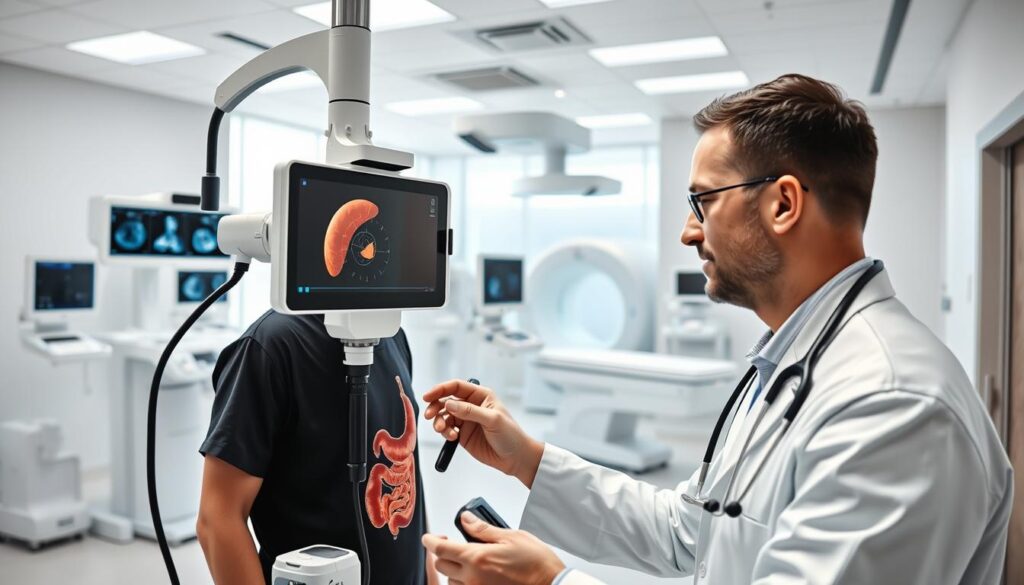Singapore is renowned for its world-class healthcare services, particularly in the field of digestive health. With a focus on personalized care, specialists here address a range of conditions such as IBS, GERD, and liver diseases. Patients benefit from tailored treatment plans designed to meet their unique needs.
The city-state is home to leading medical institutions like Mount Elizabeth, Gleneagles, and Farrer Park hospitals. These facilities are equipped with advanced diagnostic tools, including endoscopy and colonoscopy, ensuring accurate and efficient care. Singapore’s position as a medical hub combines expertise with cutting-edge technology, making it a trusted destination for digestive health solutions.
Key Takeaways
- Singapore offers world-class digestive healthcare services.
- Specialists provide personalized care for conditions like IBS and GERD.
- Top hospitals include Mount Elizabeth, Gleneagles, and Farrer Park.
- Advanced diagnostic tools like endoscopy are widely available.
- Singapore combines medical expertise with innovative technology.
Introduction to Digestive Health in Singapore
With an aging population, digestive health awareness is on the rise. Singapore’s healthcare system is addressing this need with advanced solutions and comprehensive care. Conditions like GERD, ulcers, IBS, and colorectal cancer are increasingly common, prompting a focus on early detection and treatment.
Statistics show that 1 in 5 Singaporeans experience acid reflux weekly. This highlights the importance of understanding and managing digestive disorders. Major institutions like National University Hospital (NUH) and Changi General Hospital play a pivotal role in providing specialized care.
Early cancer screening, particularly through colonoscopy services, is a key component of preventive care. Parkway East, a JCI-accredited medical centre, is among the facilities offering these essential services. Government initiatives also promote digestive health education, encouraging regular check-ups and healthy lifestyles.
Here’s a quick overview of why digestive health matters in Singapore:
- Rising awareness among the aging population.
- High prevalence of conditions like acid reflux.
- Advanced care at leading hospitals and medical centres.
- Importance of early screening for colorectal cancer.
- Government-backed health education programs.
By prioritizing digestive health, Singaporeans can enjoy better quality of life and long-term well-being.
What Does a Gastroenterologist Do?
Digestive health specialists play a vital role in diagnosing and treating a wide range of conditions. These experts focus on the entire gastrointestinal (GI) tract, from the esophagus to the rectum. They address issues like Crohn’s disease, hepatitis, and irritable bowel syndrome (IBS), ensuring patients receive tailored care.
Common Conditions Treated by Gastroenterologists
These specialists manage over 50 conditions, including acid reflux, gallbladder disorders, and pancreatic issues. Common treatments include eradicating H. pylori infections, removing gallstones, and managing inflammatory bowel disease (IBD). Early detection and effective treatment are key to improving patient outcomes.
Advanced Diagnostic Procedures
Modern diagnosis relies on advanced tools like endoscopy and colonoscopy. Capsule endoscopy allows imaging of the small intestine, while liver function tests detect fatty liver disease early. For bile duct issues, endoscopic retrograde cholangiopancreatography (ERCP) is a go-to procedure. These techniques ensure accurate diagnosis and effective care.
Why Singapore is a Hub for Gastroenterology
Singapore has emerged as a global leader in digestive health care. The city-state’s healthcare system is known for its advanced diagnostic tools and highly skilled specialists. With over 15,000 endoscopic procedures performed annually at Mount Elizabeth Hospital alone, the country is a hub for cutting-edge treatments.
Singapore’s Orchard medical clusters are home to a concentration of US and EU-trained specialists. These experts bring global expertise to the local medical centres, ensuring patients receive world-class care. Government investment in digestive health research has also played a key role, with over $50 million allocated since 2020.
Strategic partnerships with renowned institutions like Johns Hopkins and Mayo Clinic further enhance Singapore’s capabilities. These collaborations bring innovative techniques and knowledge-sharing opportunities. MedTech advancements, such as AI-powered polyp detection systems, are transforming advanced diagnostic processes.
For international patients, multilingual support is a significant advantage. Many medical centres offer services in multiple languages, making it easier for patients from diverse backgrounds to access care. This inclusivity, combined with state-of-the-art facilities, solidifies Singapore’s position as a top destination for digestive health treatments.
| Key Feature | Details |
|---|---|
| Endoscopic Procedures | 15,000+ annually at Mount Elizabeth Hospital |
| Specialists | US/EU-trained experts in Orchard medical clusters |
| Research Investment | $50M since 2020 |
| Partnerships | Johns Hopkins, Mayo Clinic |
| MedTech Advancements | AI-powered polyp detection systems |
| Multilingual Support | Available for international patients |
Key Factors to Choose the Best Gastroenterologist in Singapore
Selecting the right specialist for digestive health is crucial for effective treatment and care. With so many options available, it’s important to consider several factors to ensure you receive the best possible care.
Qualifications and Experience
Credentials matter when choosing a specialist. Look for certifications like FRCP, FASGE, and Ministry of Health accreditation. For example, Dr. John Hsiang at Farrer Park Hospital holds triple board certifications, including FRCP Edinburgh. These qualifications ensure the specialist has the necessary expertise.
Subspecialty Focus
Some specialists focus on specific areas like hepatology or inflammatory bowel disease. Dr. Kieron Lim at Mount Elizabeth specializes in liver disease, offering targeted care for complex conditions. Choosing a specialist with a subspecialty ensures you receive tailored treatment.
Hospital Affiliation
Hospital privileges can determine access to advanced diagnostic tools and equipment. Facilities like Mount Elizabeth and Gleneagles Hospital are equipped with cutting-edge technology. Multidisciplinary teams at these hospitals provide comprehensive care for complex cases.
Patient-Centered Approach
Effective communication is key to a positive patient experience. Some specialists offer extended consultation hours to discuss your concerns in detail. A patient-centered approach ensures your needs are met throughout the treatment process.
By considering these factors, you can make an informed decision and receive the best care for your digestive health needs.
Top Gastroenterologists in Singapore
Singapore’s digestive health specialists are recognized for their expertise and innovative approaches. These professionals bring a wealth of experience and cutting-edge techniques to address complex conditions. From liver diseases to colorectal cancer, they provide tailored care to meet patient needs.
Adj Asst Prof Andrew Kwek Boon Eu – Changi General Hospital
Specializing in pancreaticobiliary therapeutic endoscopy, Dr. Kwek is known for his precision and patient-centered care. His expertise ensures effective treatment for complex biliary and pancreatic conditions.
Adj A/Prof Lee Guan Huei – National University Hospital
Dr. Lee has pioneered liver transplantation techniques at NUH. His work has significantly improved outcomes for patients with advanced liver diseases.
Dr Juanda Leo Hartono – Mount Elizabeth Medical Centre
Dr. Hartono leads an IBD clinic that utilizes the latest biologic therapies. His approach focuses on managing inflammatory bowel disease with advanced treatments.
Dr John Hsiang – Farrer Park Medical Centre
At Richmond Gastroenterology Centre, Dr. Hsiang offers same-day scopes for efficient diagnosis and treatment. His clinic is known for its streamlined patient care.
Dr Calvin Koh – Gleneagles Hospital
Dr. Koh is a leader in endoscopic ultrasound techniques. His expertise ensures accurate diagnosis and minimally invasive treatments for complex cases.
Dr Chong Chern Hao – Farrer Park Medical Centre
Dr. Chong specializes in managing hepatitis and other liver conditions. His patient-focused approach ensures comprehensive care for chronic diseases.
Dr Christopher Kong San Choon – Farrer Park Hospital
Dr. Kong is skilled in advanced endoscopic procedures. His techniques improve outcomes for patients with gastrointestinal disorders.
Dr Kieron Lim – Mount Elizabeth Medical Centre
Dr. Lim focuses on liver diseases and colorectal cancer. His expertise ensures early detection and effective treatment for these conditions.
Dr Lin Cui Li – Mount Elizabeth Medical Centre
Dr. Lin is known for her work in managing complex digestive disorders. Her approach combines advanced diagnostics with personalized care.
Dr Benjamin Yip – Mount Elizabeth Medical Centre
At Alpha Digestive Centre, Dr. Yip performs complex ESD procedures with a 98% success rate. His expertise ensures effective treatment for gastrointestinal conditions.
Advanced Diagnostic and Therapeutic Services
Cutting-edge technology is transforming how digestive health issues are diagnosed and treated. Modern diagnostic therapeutic services ensure precision and efficiency, helping patients receive timely and effective care. From endoscopy to colonoscopy, these procedures are setting new standards in digestive health management.

Thomson Medical Centre is leading the way with robotic-assisted colonoscopy, offering 360° visualization for unparalleled accuracy. This advanced endoscopic technique enhances early detection of abnormalities, ensuring better patient outcomes. High-definition narrow band imaging is another breakthrough, enabling specialists to identify early-stage cancers with greater precision.
For complex cases, endoscopic mucosal resection (EMR) is used to remove large polyps effectively. The POEM procedure, designed for achalasia treatment, provides a minimally invasive solution for swallowing disorders. Wireless motility capsule studies are also available, offering detailed insights into conditions like gastroparesis.
Innovative third-space endoscopy techniques, such as per-oral pyloromyotomy, are revolutionizing treatment for gastric motility disorders. These procedures are performed by highly skilled specialists, ensuring safety and efficacy. With capsule endoscopy, patients can now undergo non-invasive imaging of the small intestine, making diagnosis more comfortable and accurate.
These advancements highlight the importance of diagnostic therapeutic services in modern healthcare. By leveraging the latest technology, specialists can provide tailored solutions for a wide range of digestive health conditions.
Specialized Care for Liver Diseases
Liver diseases require specialized care to ensure effective treatment and improved quality of life. Conditions like hepatitis, fatty liver disease, and cirrhosis demand tailored approaches for optimal outcomes. With advanced diagnostic tools and innovative therapies, patients can manage these conditions effectively.
Non-alcoholic fatty liver disease (NAFLD) is a growing concern, often linked to lifestyle factors. Specialized programs focus on diet, exercise, and medication to manage this condition. Early intervention can prevent progression to more severe stages like cirrhosis.
For accurate diagnosis, transient elastography (FibroScan) is widely used. This non-invasive test measures liver stiffness, helping specialists stage cirrhosis and monitor treatment progress. It’s a valuable tool for assessing liver function and guiding care plans.
Chronic hepatitis B and C are treated with antiviral therapies, which reduce viral load and prevent liver damage. These treatments are tailored to individual patient needs, ensuring the best possible outcomes. Regular monitoring is essential to track progress and adjust therapies as needed.
For patients with hepatobiliary tumors, ablation techniques offer minimally invasive treatment options. These procedures target tumors precisely, preserving healthy tissue and improving recovery times. Coordination with transplant teams ensures comprehensive care for complex cases.
Living donor liver transplantation is another critical service. Clinics like Dr. Desmond Wai’s manage over 100 transplant patients annually, ensuring seamless coordination and follow-up care. This life-saving procedure offers hope for patients with end-stage liver disease.
| Service | Details |
|---|---|
| NAFLD Management | Diet, exercise, and medication programs |
| FibroScan | Non-invasive cirrhosis staging |
| Antiviral Therapies | Treatment for chronic hepatitis B/C |
| Tumor Ablation | Minimally invasive hepatobiliary treatment |
| Liver Transplantation | Living donor coordination |
For more information on Management of Liver Diseases, visit the National University Hospital’s Gastroenterology and Hepatology services page. Their comprehensive approach ensures patients receive the best care for their liver health needs.
Pediatric Gastroenterology in Singapore
Children’s digestive health requires specialized attention to ensure proper growth and development. Pediatric gastroenterologists focus on diagnosing and treating disorders that affect the digestive system in young patients. From congenital issues to food allergies, these specialists provide tailored care to address unique challenges.

Dr. Christina Ong’s clinic at Mount Elizabeth Novena handles over 500 pediatric cases yearly. Her team is skilled in managing congenital conditions like biliary atresia, ensuring early intervention for better outcomes. Nutritional support is also a key focus, especially for infants experiencing failure-to-thrive.
Pediatric endoscopy is performed under strict sedation protocols to ensure safety and comfort. This procedure aids in accurate diagnosis and effective treatment of gastrointestinal issues. For adolescents with inflammatory bowel disease (IBD), transition programs help them manage their condition as they grow older.
Food allergy-related GI disorders are another area of expertise. Specialists work closely with families to identify triggers and develop management plans. This holistic approach ensures that children receive comprehensive care tailored to their needs.
| Service | Details |
|---|---|
| Congenital Conditions | Management of biliary atresia and similar issues |
| Nutritional Support | Programs for failure-to-thrive infants |
| Pediatric Endoscopy | Safe procedures under sedation protocols |
| Adolescent IBD | Transition programs for older patients |
| Food Allergy Management | Identification and treatment of GI disorders |
By addressing pediatric digestive conditions early, specialists help children lead healthier lives. With advanced treatment options and compassionate care, Singapore’s pediatric gastroenterology services are making a significant impact.
Minimally Invasive Procedures
Modern medicine is evolving with techniques that prioritize patient comfort and faster recovery. Minimally invasive procedures are at the forefront of this transformation, offering effective treatment with reduced downtime. These methods are particularly beneficial for digestive health, where precision and efficiency are crucial.
One standout technique is Endoscopic Submucosal Dissection (ESD), offered at Farrer Park Hospital. This advanced endoscopic procedure is designed for early gastric cancers, allowing specialists to remove tumors with minimal damage to surrounding tissue. Patients benefit from quicker recovery and fewer complications compared to traditional surgery.
Other innovative procedures include:
- Single-incision laparoscopic cholecystectomy: A less invasive method for gallbladder removal, reducing scarring and recovery time.
- POEM (Per Oral Endoscopic Myotomy): A solution for esophageal disorders like achalasia, performed entirely through the mouth.
- Robotic-assisted colorectal resections: Enhanced precision for complex colorectal surgeries, ensuring better outcomes.
These minimally invasive techniques are supported by cutting-edge technology and skilled specialists. For example, endoscopic ultrasound-guided drainage is used to treat pancreatic pseudocysts, offering a safer alternative to open surgery. Similarly, natural orifice specimen extraction surgery allows for tumor removal without external incisions.
| Procedure | Application |
|---|---|
| ESD | Early gastric cancer treatment |
| POEM | Esophageal disorders |
| Robotic-assisted resections | Colorectal surgeries |
| Endoscopic ultrasound-guided drainage | Pancreatic pseudocysts |
By leveraging these procedures, patients can achieve better diagnosis and treatment outcomes. The focus on minimally invasive methods ensures a smoother recovery process and improved quality of life.
Patient Testimonials and Reviews
Real-life stories from patients provide valuable insights into treatment outcomes. Acorn Gastroenterology, for instance, maintains an impressive 4.9/5 rating from 126 verified patients. These reviews highlight the quality of care and personalized approach that define digestive health services in Singapore.
One notable case involves GERD management at Gleneagles Hospital. A patient shared, “The team’s expertise and attention to detail made all the difference. I felt supported throughout my treatment journey.” Such testimonials underscore the effectiveness of tailored care plans for chronic conditions.

Colorectal cancer screening experiences also stand out. Many patients at Farrer Park have praised the seamless process and compassionate care. “Early detection saved my life,” one patient noted. “The staff made me feel at ease during every step.”
International patients at Mount Elizabeth Hospital often highlight the facility’s world-class standards. “Coming from abroad, I was impressed by the efficiency and expertise,” shared a patient from Indonesia. Multilingual support and advanced technology make it a preferred choice for global visitors.
Recovery timelines from complex hepatobiliary surgeries are another area of praise. Patients appreciate the clear communication and follow-up care. “The team ensured I understood every aspect of my recovery,” said one patient. This level of support fosters confidence and trust.
Insurance claim assistance success stories further enhance patient satisfaction. Many clinics, including those at Farrer Park, offer dedicated support to simplify the process. “Navigating insurance was stress-free, thanks to their guidance,” a patient remarked.
These testimonials reflect the best gastroenterologist practices in Singapore. By prioritizing patient needs and delivering exceptional care, specialists continue to earn trust and recognition.
How to Book an Appointment
Booking an appointment with a digestive health specialist is simple and convenient. Most medical centres and hospitals in Singapore offer online platforms like DoctorPage for easy scheduling. Whether you’re visiting a public or private facility, the process is designed to be hassle-free.
For public hospitals, you’ll need a referral from a general practitioner. Private medical centres, such as Mount Elizabeth and Farrer Park Hospital, allow direct bookings. Both options ensure quick access to specialists and advanced care.
Telemedicine consultations are also available for non-urgent cases. This option is ideal for follow-ups or initial assessments. Patients can connect with specialists from the comfort of their homes, saving time and effort.
Preparation is key for procedures like endoscopy. Clinics provide detailed checklists to ensure patients are ready. These include fasting guidelines and medication instructions. Following these steps ensures accurate results and a smooth experience.
Multilingual administrative support is another advantage. Many medical centres offer services in multiple languages, making it easier for international patients. This inclusivity ensures everyone receives the care they need.
For acute conditions, emergency contact protocols are in place. Facilities like Mount Elizabeth and Farrer Park Hospital have dedicated teams to handle urgent cases. Patients can reach out for immediate assistance when needed.
By following these steps, you can easily book an appointment and access the care you need. Whether it’s a routine check-up or a complex procedure, Singapore’s medical centres are equipped to provide exceptional service.
Cost of Gastroenterology Services in Singapore
Understanding the costs of digestive health services is essential for informed decision-making. Whether you’re seeking routine check-ups or advanced treatment, knowing the financial aspects helps you plan better. Singapore’s healthcare system offers a range of options to suit different budgets.
For procedures like colonoscopy, costs vary based on the hospital tier. On average, prices range from $1,800 to $4,500. Public medical centres often provide subsidized rates, while private facilities like Park Hospital offer premium services with advanced amenities.

The Ministry of Health (MOH) provides a Fee Benchmark Reference for common procedures. This ensures transparency and helps patients compare costs across different facilities. Additionally, public hospitals offer subsidy frameworks based on income levels, making treatment more accessible.
Insurance coverage is another key factor. Integrated Shield Plans and MediSave can significantly reduce out-of-pocket expenses. Many medical centres also offer package deals for surveillance endoscopies, providing cost-effective options for long-term care.
Financial counseling services are available to guide patients through payment options. These services help you understand insurance claims, subsidies, and payment plans. By leveraging these resources, you can manage costs effectively while receiving quality care.
| Service | Cost Range |
|---|---|
| Colonoscopy | $1,800 – $4,500 |
| Public Hospital Subsidies | Up to 80% based on income |
| Insurance Coverage | Integrated Shield Plans, MediSave |
| Package Deals | Surveillance endoscopies |
| Financial Counseling | Available at most medical centres |
Conclusion
Digestive health care in Singapore combines expertise with advanced technology for optimal patient outcomes. The city-state’s leadership in this field ensures access to world-class treatments and personalized care plans tailored to individual needs.
Finding the right specialist is crucial for effective treatment. Singapore’s gastroenterologists are highly skilled, offering tailored solutions for a wide range of conditions. Preventive screenings play a vital role in early detection and management of digestive disorders.
Treatment modalities continue to evolve, with innovations like minimally invasive procedures and AI-powered diagnostics. These advancements ensure patients receive the most effective care with minimal discomfort.
For continued health management, resources like the National University Hospital’s Gastroenterology and Hepatology services provide comprehensive support. Taking proactive steps today can lead to a healthier tomorrow.


